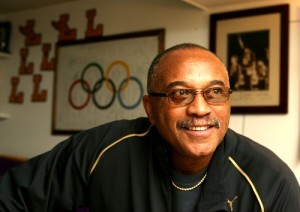Folders |
DyeStatFL 2015 Black History Month Tribute - Tommie SmithPublished by
Ka’Deem Wynn | Writer
In the summer of 1968, Tommie Smith of the United States became one of the most iconic symbols of not only the Civil Rights Movement, but of the entire twentieth-century. After running the then world record in the 200 meter dash (19.83), and receiving the gold medal at the 1968 Summer Olympics, Smith did the unthinkable. In front of thousands of spectators and millions more watching on television, many of whom at that time strongly believed in segregation, he, along with teammate John Carlos, made a fist and raised his right hand over his head. It was the ultimate silent gesture of something greater
Before 1968
Tommie Smith was born on June 6, 1944 in Clarksville, Texas. He was the seventh out of 12 children, and suffered from pneumonia as a child. Despite the early sickness, Smith grew up quite athletic.
Smith began to show some potential when he reached high school. While attending Lemore High School in Lemore, California, Smith became an all-around athlete, being able to play football, basketball, and run track. He was voted Lemore’s Most Valuable Player in all three sports.
In track, Smith set most of the school records, many of which still stand today. Smith won the 440-yard dash (402.3 meters) at the 1963 CIF California State Meet. With his achievements from the three sports, Smith earned a scholarship to San Jose State.
Now in college, Smith had much success leading up to the 1968 Olympics. On May 7, 1966, Smith set a world best of 19.5 in the 200 meter straight, which was run on a cinder track. That record stood for just over 44 years until Tyson Gay broke it on May 16, 2010 (19.41). Despite that, Smith still holds the record for the slightly longer 220-yard event. Since the IAAF has abandoned ratifying records for the event, Smith will retain the official record for the straightaway 200 meters/220 yards in perpetuity.
Some weeks later on June 11, 1966, Smith set the record for 200 meters and 220-yards around a turn at 20.0, becoming the first man to do it in 20 seconds. Six days later he won the NCAA Men's Outdoor Track and Field
Championship. Smith also won the national collegiate 220-yard (201.17 meters) title in 1967 before adding the AAU furlong (201.17 meters) crown as well. He would travel to Japan for the 1967 Summer Universiade and won the 200 m gold medal. He repeated as AAU 200-meter champion in 1968 and made the Olympic team.
1968
Coming into the 1968 Olympics in Mexico, Smith had been nursing a hamstring injury going into the 200 meter final.
At the start of the race, his teammate from San Jose State, John Carlos ( born June 5, 1945), exploded out of the blocks, taking an early lead over Smith, who got out slower. Carlos led the turn, but Smith took over as they came off of it. Surging past Carlos, who was his closest foe and training partner, Smith ran for the gold. Realizing that the gold was within reach, Smith threw up
He improved upon his own world record that would last for 11 years until Pietro Mennea would surpass upon it on the same track. His time of 19.83 was recognized as the first automatically timed world record for the event by the IAAF, nine years later.
As people railed against Apartheid in South Africa and racial segregation in the United States, Tommie Smith and John Carlos raised their fists during the playing of the Star Spangled Banner to show solidarity with people fighting internationally for human rights. They kept their fists raised until the anthem was done. During what is usually referred to as the 1968 Olympics Black Power salute, the two athletes were booed and forced out of the Games by the president of the International Olympic Committee at the time, Avery Brundage.
Smith, Carlos and Australian silver medalist Peter Norman (June 15, 1942-October 3, 2006) all wore human rights badges on their jackets. In his autobiography, Silent Gesture, Tommie Smith stated that the gesture was not a "Black Power" salute, but a "human rights salute". The event is regarded as one of the most overtly political statements in the history of the modern Olympic Games.
People who opposed the protest said the actions disgraced all Americans. Supporters, on the other hand, praised the men for their bravery. The men's gesture had lingering effects for all three athletes, the most serious of which were death threats against Smith, Carlos and their families.
After The Olympics
During his career, Smith set seven individual world records and also was a member of several world-record relay teams at San Jose State, where he was coached by Lloyd “Bud” Winter. With personal records of 10.1 for 100 meters, 19.83 for 200 and 44.5 for the 400 meters, Smith still ranks high on the world all-time lists. Smith, who had been drafted by the National Football League's Los Angeles Rams in the ninth round of the 1967 NFL Draft, signed to play for the American Football League's Cincinnati Bengals and was part of the team's taxi squad for most of three seasons as a wide receiver. During the 1969 season, he played in two games, catching one pass for 41 yards. After his track and football careers, he became a member of the United States National Track and Field Hall of Fame in 1978. In 1996, Smith was inducted into the California Black Sports Hall of Fame, and in 1999 he received that organization's Sportsman of the Millennium Award. In 2000-2001 the County of Los Angeles and the State of Texas presented Smith with commendation, recognition and proclamation awards. He later became a track coach at Oberlin College in Ohio, where he also taught sociology and until recently was a faculty member at Santa Monica College in Santa Monica, California. In August 2008, Tommie Smith gave 2008 Olympic triple gold winner Usain Bolt of Jamaica one of his shoes from the 1968 Olympics as a birthday gift. In 2010, Smith announced that he would sell the gold medal he won at the 1968 Olympics in Mexico City. He put his gold medal for the 200 meters and spikes up for auction. The bid started at $250,000, and the sale was scheduled to close November 4, 2010. Many may not know about Smith and his career, but the picture of him standing on the podium will forever be part of not only his life, but the millions who witnessed it, and all of sports history.
More news |
Kwynn16
Runner and Writer.
Palm Coast, Florida, 32164, United States


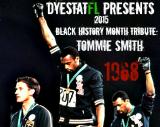

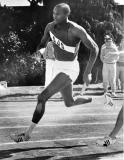
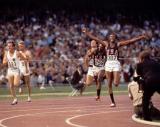

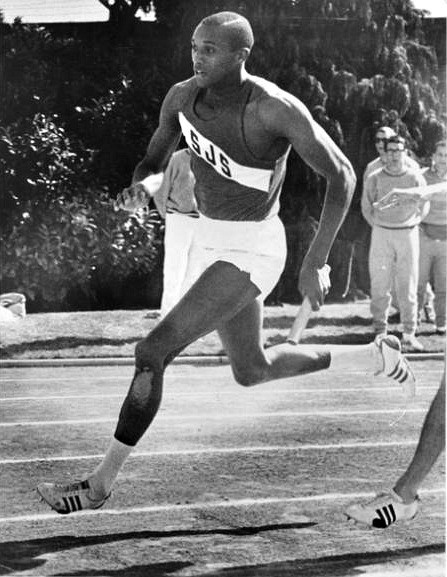
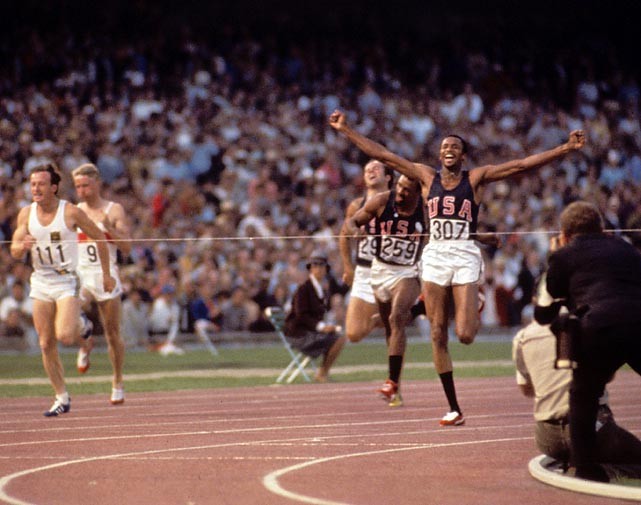 his arms in the last 10 meters. He could be seen after the race limping to a stop after crossing the finish line
his arms in the last 10 meters. He could be seen after the race limping to a stop after crossing the finish line 